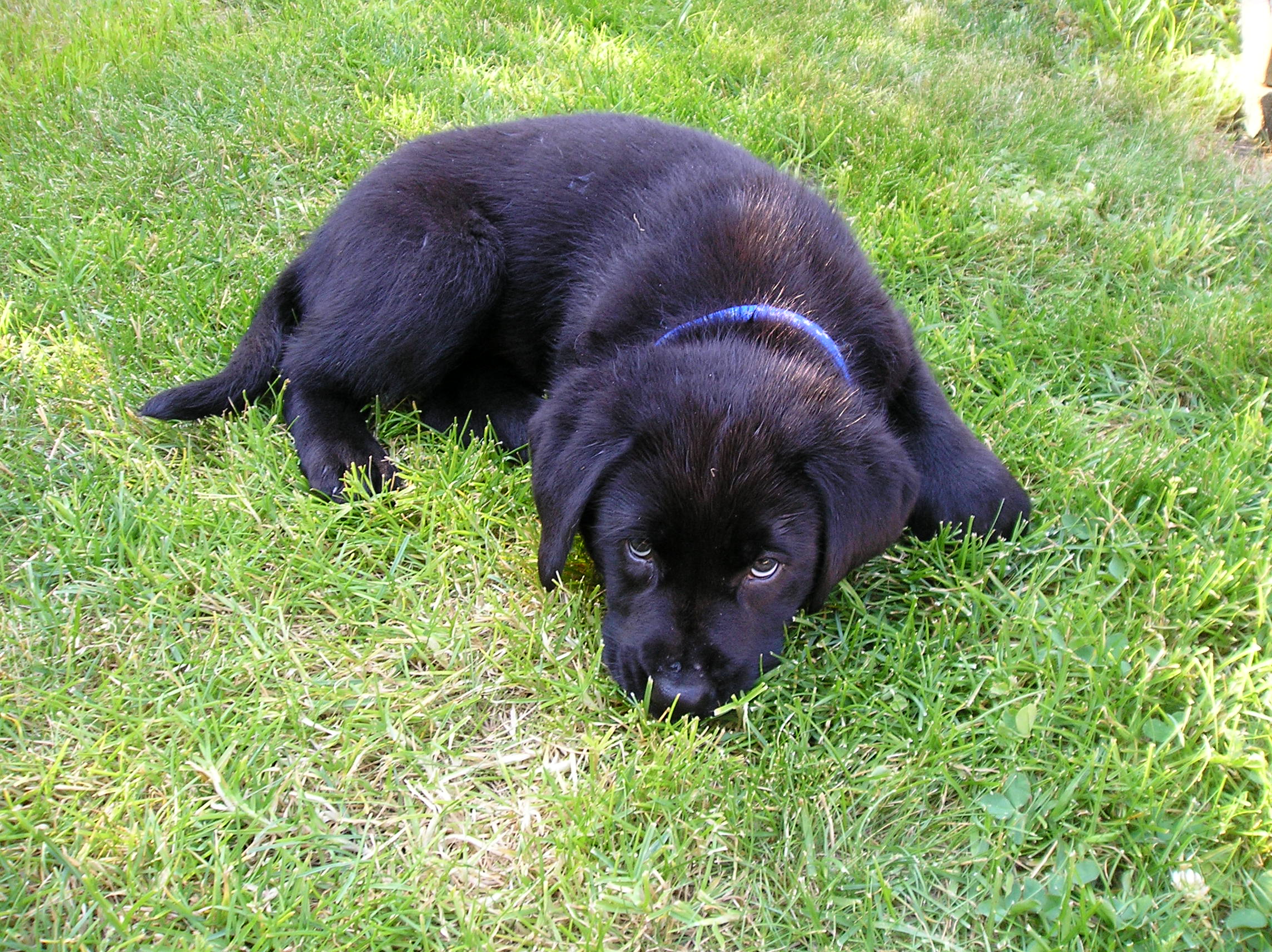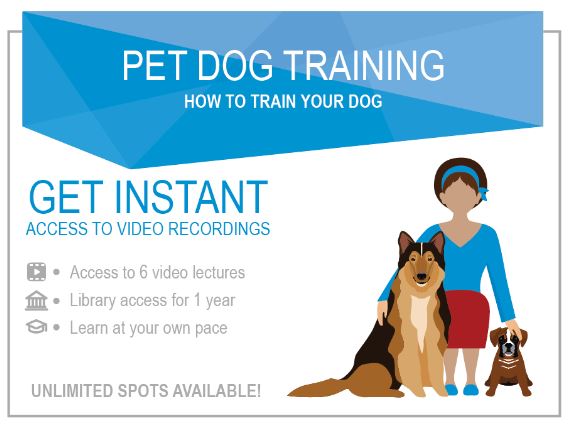Course Details
Preparing for New Puppy - From Prep to Family Member AND
Building Puppy Confidence: Give Your Puppy the Gift of Optimism AND
Crate Training Dogs: Happy Crating for Life AND
How to House Train Your Dog: Plans and Problem Solving AND
Enrichment for Dogs: Ditch the Bowl, Better Their Life! AND
Socializing a New Puppy: Prepare Your Dog for Life

Sara Brueske - Preparing for New Puppy: From Prep to Family Member
Are you bringing home a new puppy? Or have you recently brought home a new-to-you family member? This course will cover what you need to know to properly integrate your new puppy into your household.
This course is broken into four sections:
- 1. Before bringing your dog home: What you need to know
- 2. Bringing your dog home: The first 24 hours
- 3. Developing good habits: The first two weeks
- 4. Building your relationship: The first month
It’s important to have your house setup and your supplies for your new addition ready before bringing your puppy home. In this section, we will talk about what supplies are needed, what supplies aren’t really necessary and where they should be situated in your home.
The next section discusses Gotcha Day, the day you bring home your new puppy. This includes the car ride home, introducing to new family members, showing them their new house and yard as well as how to tell if your puppy is confident and happy. These first introductions are critical in building the life-long friendships that a dog can bring to your family.
The first few weeks are the most important when bringing home a new puppy. During this time, your dog is getting to know you, your family and their new routine. This is also the time when new habits are being learned, we’ll talk about how to make sure that your new puppy is learning good habits instead of problem behaviors that will need to be fixed later on.
Relationship building is an important aspect in your puppy’s life, the relationship that you build within the first month will ensure that you and your puppy will have a long-life built on trust and understanding. We will talk about socialization, basic training and the must-do’s during this time.
Julie Daniels - Building Puppy Confidence: Give Your Puppy the Gift of Optimism
Raising a puppy to do well in a human-centered world is a big challenge! And every puppy is a mix of easy and difficult traits to live with. What’s the best way to focus your puppy time to bring out the best in your life together?
We all want a puppy who is relaxed and comfortable about life with us. We want our puppy to be somewhat easy to live with, fun to train, and adaptable to new experiences as we enjoy our adventures together. That is the focus of this presentation.
In this presentation we will focus on four main categories that will open those doors for us:
- 1. Action and Movement - We’ll encourage exploration. We’ll have fun teaching our puppies to come when called! We’ll set up safe equipment and let our puppies climb and balance. We’ll foster resilience by encouraging our puppies to bounce back when they fall.
- 2. Value for Novelty - We’ll encourage curiosity and optimism. Familiar items out of place! Surprise is fun. New experiences begin at home!
- 3. Play - We’ll nurture social joy and cooperative interactions with humans and dogs. We’ll look at appropriate dog-dog play in young puppies and teenagers.
- 4. Training - We’ll teach our puppy useful life skills through fun and games.
We’ll use clickers and other markers to catch our puppies doing good things! Positive reinforcement training is empowering! It’s wonderful to bond with a puppy and build the relationship we want to share with them. This webinar will give you many good ideas! It’s a solid set of guidelines. It includes many examples and demonstrations to show you how to nurture your puppy’s confidence. A confident puppy has a calm and comfortable way of interacting with the world. And it all begins with simple games and exercises you can enjoy with your puppy at home.
Sarah Stremming - Crate Training Dogs: Happy Crating for Life
Throughout your dog's life, there will be times when a crate is vital for his safety. A crate trained dog can easily travel, spend time at the vet or groomer, and be contained at home so that he can't get into trouble. But it is normal for puppies or young dogs who are not familiar with crating to be quite upset about the confinement. It isn't fair for you or your new dog to sit through hours of whining and barking, and you don't have to! With this program your dog can learn to see his crate as a cue to relax, a place to chew a bone, eat a meal, or take a nap. He can learn to seek out his crate as a good place to be. Traditional crate training approaches have relied either on allowing the pup to "cry it out" on his own, or on the heavy use of food "pacifiers" that can be hard to get away from. As a bonus your dog will learn to go into his crate when you ask him to, and how to release from the crate on cue, too, making things like unloading from the car much safer. With some dedication to the process, you can create happy crating for life for your dog!
Deb Jones - How to House Train Your Dog: Plans and Problem Solving
House training can be hard! We all want our dogs to learn, as quickly as possible, where they should go when nature calls. Sometimes this process goes fairly smoothly, and in other cases it can seem like an impossible task. People often underestimate the time and dedication it can take to sufficiently house train a puppy. When problems persist or develop in adulthood we may be at a loss as to how to proceed. In this presentation we will consider why house training can be so difficult and what we can do to help our dogs understand what we want.
We will discuss approaches with puppies as well as adult dogs. In this section we consider the importance of realistic expectations, substrate (surface) preferences, and location choices.
Common health issues, such as urinary tract infections and certain medications, may impact house training as well, so we will discuss and consider those. We always want to rule out physical issues first, particularly if this is a new or increasing problem.
Setting up the environment for success is an incredibly important part of the house training process. The smart use of crates, exercise pens, and gates will be considered. We will discuss how to use these options in a positive and effective manner. Setting up reasonable potty schedules and enlisting the help of everyone in the household can make a huge difference in how long this process takes.
And of course, we will talk about training plans and approaches. There is a lot we can do to help our dogs understand where we want them to go! Potty training may seem like a huge or impossible task, but it is not. With the right set of tools we can tailor our approach to be successful as quickly as possible, and to help our dogs develop good lifetime potty habits. It’s a big job but it pays off for years and years with a well-trained dog. Take a look and see how we can help you with this important task!
Sarah Stremming - Enrichment for Dogs: Ditch the Bowl, Better Their Life!
Our dogs are thinking beings with agendas and opinions. Many behavior problems arise when we ignore this fact and attempt to treat them like fuzzy couch ornaments. Leveraging their simple caloric intakes needs is a great place to start in offering them the brain candy they so desperately need. Daily enrichment activities, like food puzzles and scent games entertain wild puppies and keep older minds active. Dog is destructive? Provide ample shredding opportunities that are appropriate, inexpensive, and enticing to save your shoes. Dog barks incessantly? Scent-based enrichment turns off the voice because scenting and vocalizing are simply incompatible. Enriching our dogs' lives helps them to engage in fewer undesirable behaviors, and it helps them live happier more fulfilled lives. It doesn't take a lot of money or a lot of time to provide your dog with the mental stimulation he desires on a daily basis. Food, scent, and novelty based enrichment plans are all here for the taking!
Laura VanArendonkBaugh - Socializing a New Puppy: Prepare Your Dog for Life
There's so much to do with a new addition to the family, and you've heard how important socialization is. Make sure your puppy meets a lot of people, everyone says, and see that he’s introduced to dogs for lots of play dates. Fortunately, you've enrolled in a group puppy class and you've got some plans for the park, so you're all set, right? Right? Maybe not.
Socialization is a deceptively simple name for a complex psychological and physiological stage of development which will affect the rest of your dog's life, influencing everything from his reaction to fireworks to his comfort at the vet clinic to his ability to relax while you travel on vacation (whenever that happens again). It’s a hugely important, and hugely misunderstood, period and process. But the good news is, it doesn't have to be complicated to address! A little thoughtful planning and some foundational training will prepare your puppy to adapt to human society and all its quirks, with an open mind ready to learn best behavior.
This presentation will cover the science of socialization and will debunk some common myths which can actually hinder your puppy’s learning. We’ll learn why socialization is even more important than manners training (but why it’s perfectly fine, and not too hard, to do both at once) and why it’s available for such a limited window in puppy development, lending urgency. We’ll address the behavioral benefits of socialization, the three foundational exercises to train to simplify your socialization process, simple approaches to broad socialization, and how to set up an intentional socialization session (and what to do if something goes wrong!). Plus, learn how playtime, though often neglected as a socialization technique, can be one of your most powerful learning tools.
We’ll also talk about balancing the need for socialization with the caution of handling in public a puppy who has not completed vaccinations, with some best practices to promote health and safety while taking advantage of that prime socialization window.
In addition, there will be discussion of how to apply similar techniques to help an adult dog who did not receive appropriate socialization as a puppy, and what results one can reasonably expect.
Socialization is a simple name for a complex psychological and physiological stage of development which will affect the rest of your dog's life -- but the good news is, it doesn't have to be complicated to address. A little thoughtful planning and some foundational training will prepare your puppy to adapt to human society and all its quirks, with an open mind ready to learn best behavior!
This presentation will cover the behavioral benefits of socialization, the three foundational exercises to train to simplify your socialization process, simple approaches to broad socialization, and how to set up a socialization session (and what to do if something goes wrong!). Plus, learn how playtime can be one of your most powerful learning tools."
Watch the Video Trailer with Sample Clips from All Presentations:
